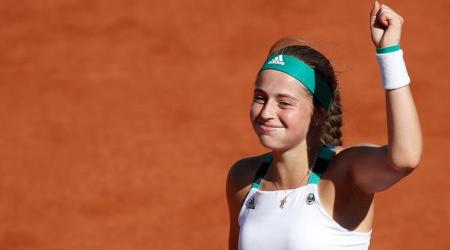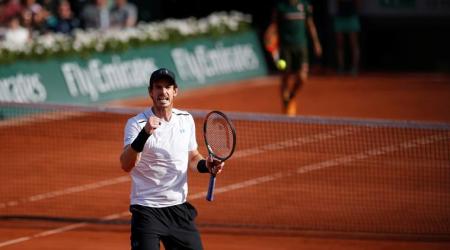 Gabriela Dabrowski and Rohan Bopanna hold the trophy after they defeated Anna-Lena Groenefeld and Robert Farah in the mixed doubles final of the French Open at Roland Garros stadium, in Paris on Thursday. (Source: AP)
Gabriela Dabrowski and Rohan Bopanna hold the trophy after they defeated Anna-Lena Groenefeld and Robert Farah in the mixed doubles final of the French Open at Roland Garros stadium, in Paris on Thursday. (Source: AP)
There was an unsaid promise that Rohan Bopanna left behind, as he walked off court, after losing the 2010 US Open doubles final. He had become only the fourth Indian to reach the final of a Grand Slam, but there was a spark in the rise of the late-bloomer — more was certain to come. But it took him seven years to get another chance at winning his first major.
At Roland Garros in Paris, he reached the summit of the French Open mixed doubles. Now a 37-year-old veteran, he was a different caliber of player.
“Whatever round you reach, you always want to go one further. The last time, I was in the final in 2010. But now there were no nerves. I had been in this situation before, at the highest level,” Bopanna said.
Pairing up with 25-year-old Canadian, Gabriela Dabrowski, the duo started the final by dropping their first set of the tournament, yet came back to win 2-6, 6-2, 12-10 against Anna-Lena Groenefeld and Robert Farah.
“It’s taken me seven years to get to another final. I’ve had some tough losses, but more than relief, it was just a proud moment of getting that Grand Slam,” he said.
In his 14th year on the professional circuit, he followed doubles titles at Chennai and Dubai with the biggest title for the world No 22.
“The main difference has been having that belief of going there and working hard. Also the partners I’ve had in the past few weeks, Pablo Cuevas, has helped me and my ground strokes have gotten better.”
But it wasn’t just about learning from his partners. At the French Open, he employed a change in strategy that proved to be crucial.
“I wasn’t serving and volleying, but I was serving and staying back,” he says. “I was using my forehand as a weapon. It was about bringing something new to my game. It gave me the option of going up or just staying back and playing my ground strokes. It’s helped me understand the game and clay surface better.”
Throughout the tournament, the Bopanna-Dabrowski duo — which first got together at the US Open last year and also played together at the Australian Open in January — swept away their challengers, reaching the final without dropping a set.
The summit clash
But at the summit, there was a stage when they were down two match points. And it took all the experience and composure of Bopanna to guide his teammate.
“I told my partner to stay aggressive and not change anything. We had to keep playing the way we were. And then she played an unbelieveable return on Robert’s serve that swung the momentum in our favour,” he recalls.
The win made Bopanna only the fourth Indian to win a Grand Slam, along with Mahesh Bhupathi, Leander Paes and Sania Mirza. Coincidentally, the title came exactly 20 years after Bhupathi became the first Indian Grand Slam winner, also winning the mixed doubles event at the French Open in 1997.
“It’s tremendous to be a part of the only four people to have won a Grand Slam for India. But at the end of the day, this is what you want to do when you start playing,” he says.
The frustration of going through all the years of suffering cruel defeats, the losses in finals of ATP events, losing the bronze-medal match at the Rio Olympics last year, and that 2010 US Open final against the Bryan Brothers, has all finally been put to rest. Bopanna is a Grand Slam champion. But in that journey, he never had any regrets. “What’s happened, happened. Can’t change the past but can look forward.”
It’s been a mantra he has been following all his career. One that has finally paid off.

